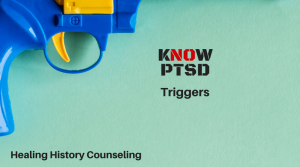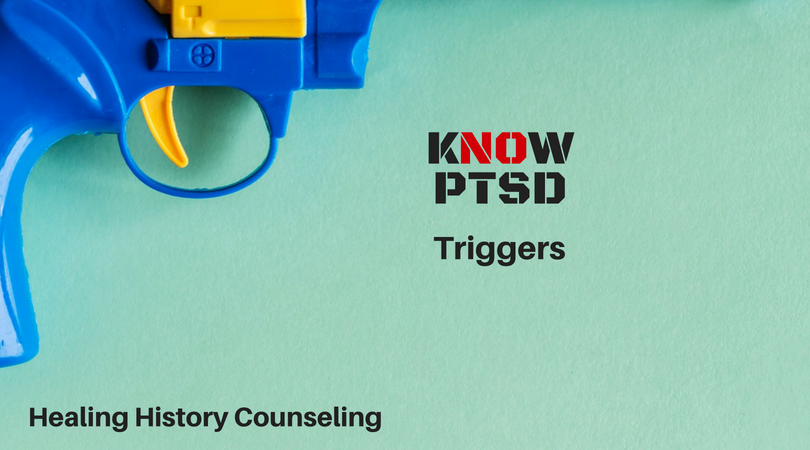

With the July 4th holiday just a few days away, I started thinking about fireworks. Not just the joy of watching them but also how they can be upsetting for war veterans. This got me thinking about triggers in general. So, this week’s blog is all about triggers: What are they? What causes them? Can we avoid them? What can we do if we can’t avoid them? If it brings up something upsetting, how do we get out of the memory? What can we do to stop them for good?
What are triggers?
A trigger is something we experience in our current life that reminds us of our past. A trigger will cause an involuntary memory. Triggers can bring up either good or bad memories. When I smell wood burning on cold evening air, I remember Christmas in New Hampshire. The excitement and joy come flooding back in. Unfortunately, triggers can also bring up really upsetting memories too. When an individual has experienced something very upsetting that they have not been able to process and release, these triggers can push them into a flashback. Flashbacks are not just memories that being revisited, they are being re-experienced! The individual in a flashback may totally loose awareness of what is going on around them. They may be smelling, hearing, tasting, feeling (both physically and emotionally) and seeing that awful event.
What causes us to develop triggers?
Triggers are created by an experience where we had extremely strong emotions. My memories of Christmases past are some of my happiest and when I experience something that is similar to those events, my brain makes the connection and pulls up the memory. Unfortunately, our brains are even more likely to pull up unresolved traumatic or upsetting memories. This is because our brains don’t like unresolved stuff. Our brain wants to process and make sense of our experiences. But traumatic and very upsetting memories can overwhelm our brains natural ability to process experiences. Because our brain can’t resolve them, and it really wants to, it’s looking for any way to bring it to our attention, so it can be resolved.
Can I avoid my triggers?
Well that depends on a number of factors:
- Do you know what your triggers are? If you don’t know what will trigger you, you can’t learn to manage them. Does even thinking about what triggers you cause you to become triggered? If that is the case, I strongly recommend doing this work with the help of a professional.
- Can they be avoided? Depending on what your triggers are, it may be very easy to avoid experiencing your triggers (if your triggers are locations in state you no longer live in, it may be easy to do). If your triggers are common everyday things, it may be impossible to avoid them; then you must learn to manage them.
- Will avoiding your triggers really impact your quality of life? If avoiding your triggers means you can’t have the life you want; then it is probably better to learn to manage your triggers.
How do I manage my triggers?
- Know your triggers. The best way to manage a trigger is to know when you are going to be triggered. That way you can act to avert what happens when you get triggered. Which requires you to know your triggers.
- Do you have a plan? Just knowing what your triggers are is not enough. You also need to know what to do when you know that something is going to trigger you.
- Have you practiced your plan? Having a plan isn’t enough either. You have to know what to do even when you can’t think clearly. This means practicing when you’re calm and also when you are upset (Do this with a very small upset, like a 1-3 on a scale of 10 with 10 being the most upset you can be). We use a different part of our brain when we are in a danger response (Fight or Flight) then we do when we are calm.
- Do you have a plan for if you still get triggered? Just knowing what you are going to do if you still get triggered can help lower your worry and fear about being triggered, which will decrease the likelihood of being triggered.
Tips to manage triggers
- Talk yourself through it. When you know a trigger is coming start talking about what’s about to happen. Be positive and confident. “I’m going to grandma’s house tomorrow; her house always smells like hay and horses. That smell can be a trigger for me. Just because I smell that smell does not mean I have to relive that bad experience.” Then talk yourself through it when you are experiencing the possible trigger “This is not then. I am a grown adult. That did not happen here. I am safe.”
- Distract yourself. Give yourself something else to do that requires a lot of attention and focus. Try to remember the Gettysburg Address speech. Say the alphabet backwards. Count down from 100 by subtracting 7 each time.
- Focus on an alternative. If the trigger is a smell, have a different strong smell with you and sniff it. Use a really strong flavor: extreme sour candy, horehound candy (you’ll either love it or hate it but it’s strong), hot sauce (tabasco sells tiny bottles online), etc.
How to get out of a flashback if you get triggered
- Intense sensations. Strong smells, tastes, and feeling an object that disproves or pulls you out of the flashback.
- Disprove you’re there. Point out (aloud if you need to) all the things that disprove being in that actual time of the awful experience. “I am an adult.”, “I know (friend’s name) now. I didn’t know them then.”, “I am sitting on grass, there was no grass there”, etc.
- Focus on what’s out of place. Sometimes a flashback is like two experiences happening at once. Look around, find an item that is in your current, real time, location; and focus on it see every detail. Use that item to pull the current experience in front of the flashback.
Neutralizing triggers
The best way to make something not trigger a bad memory or flashback is to heal from the awful experience that created the trigger. Once the original experience is released it can be very easy to let go of triggers too.
I am a therapist in Austin Texas. I specialize in helping adults heal from difficult childhoods, childhood trauma, CSA (Childhood Sexual Abuse), sexual assault, PTSD (Post Traumatic Stress Disorder), and cPTSD (complex PTSD). If you are interested in working with me to heal the trauma that created your triggers, schedule your free 30-minute consultation now.
Hi, are you also doing virtual therapy?
I do offer video sessions. I am only licensed in the state of Texas, thus you would need to be a resident of Texas.
Hello! You’ve done an incredible job here. I’ll definitely bookmark it and enthusiastically suggest it to my friends. I’m sure they’ll find this website quite beneficial.
Simply desire to say your article is as surprising The clearness in your post is simply excellent and i could assume you are an expert on this subject Fine with your permission let me to grab your feed to keep up to date with forthcoming post Thanks a million and please carry on the gratifying work
What a remarkable article! The way you’ve tackled the topic with such precision and depth is commendable. Readers are sure to gain a great deal from the wealth of knowledge and practical insights you’ve shared. Your profound understanding of the subject shines through every part of the piece. I’m eager to see more of your exceptional work. Thank you for offering your expertise and providing us with such enlightening and comprehensive content.